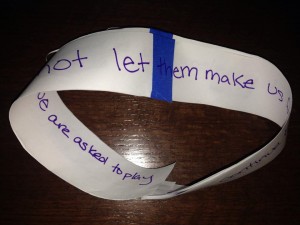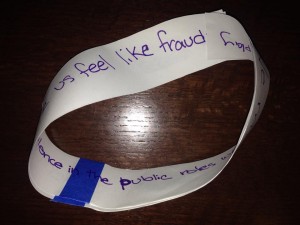I know you all diligently read Beyond the Elms and greatly appreciate the work the bloggers put into each of our posts (just go with me here…). What you might not know, is that there’s a fabulous curator of this blog who edits all our posts, constantly advises and inspires us, and finds the most entertaining gifs for our weekly emails. Her name is Lesley Bonds and tomorrow is her last day at Scripps because it was unfair of us to hog all of her amazingness for 3 years. She’s accepted a position in which she will be directing a program for first generation college students. Personally, I’m beyond excited that she’s pursuing work that she loves and she’s great at, because it means all of the advice she’s given me over the years, to refuse to settle and continue looking for exciting opportunities, hasn’t been BS.
That said, CP&R (and Scripps as a whole) isn’t going to be the same without her and we want to make sure she realizes the impact she’s had. If you didn’t get a chance to meet our resident intersectional-feminist, empowering, and generally wonderful role-model, here’s what you missed out on:
“Three years ago, I met with Lesley for the first time at CP&R. As an already anxious first year, the support she showed for my professional and personal well being meant more than words can describe. Lesley not only helped me write my first resume and cover letter, but she showed me how to navigate the larger job world. Her advice and expertise has definitely helped me get where I am today. ” – Lily Comba
“I think Lesley is great because she made CP&R so welcoming during my first year as a low income student of color. She played a big role in making me realize that I can major in whatever I want and still have stability and a bunch of career options. She also directed me to SCORE, different socially aware internship sites, and helped me find my interest in higher education/student affairs. Also, she has been one of my go to people whenever I’ve had unexpected existential crisis. 🙂 ” – Chandra Dickey
“I’ve been meeting with Lesley since the beginning of the year and she’s such an amazing Career Counselor and person! Lesley is so helpful and just understands students–her ability to connect with students is amazing. From meeting with her and working with her on Beyond the Elms, I know that Lesley a positive impact anywhere and everywhere she goes. But I will definitely miss her advice, GIFs, and positive attitude.” – Elisabeth Mayer
“Lesley is awesome in every sense. From her love of The Beatles (that may surpass my own), to her adorable collection of cat pictures, to her way of finding the perfect gifs for every situation, Lesley is just amazing. Scripps and I will miss her greatly!” – Isabella Levin
“Lesley reassured me that my feminist values can (and should!) have a place in any job I pursued and showed me how to let that structure me search. She told me it was okay to ask employers hard questions about their social justice orientation when it mattered to me- without that guidance I might have ended up in a position that didn’t value my feminisms!” – Claire Hirschberg
“Lesley helped me stay focused and calm during one of the most stressful times in my life! She always pointed out details I might have not otherwise considered, which helped me get noticed by companies I NEVER thought would look at me twice. It’s sad to see her go, but I am so excited to see what she does next!” – Megan Goldman
“Lesley always knows to deliver some sassy feminist one-liners to brighten your day no matter how stressed you are about the job search!” – Rachel Grate
“Lesley is amazing at providing support and guidance that meets students where we are in the cycle of figuring our life/the next 2 months out. I feel like my time working with Lesley is like career personal training–every session I feel more confident and better prepared to tackle career hurdles and reach my goals.” – Mia Shackelford
“Working with Lesley has taught me so much about how to advocate for myself personally an professionally and how to identify who I want to be in this world. Whenever I’m lost or confused about something–be it job applications and networking or personal life–I literally think WWLD (What Would Lesley Do)?” – Laurel Schwartz
Thank you so much for everything Lesley. We’re going to miss you so much. Enjoy your life after Scripps beyond the elms. Please come visit soon.



